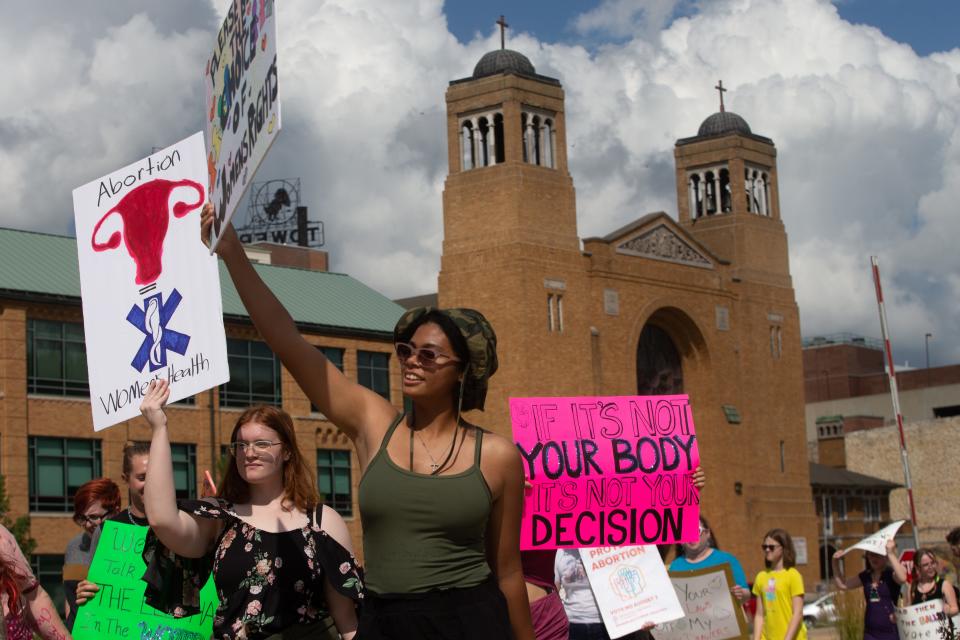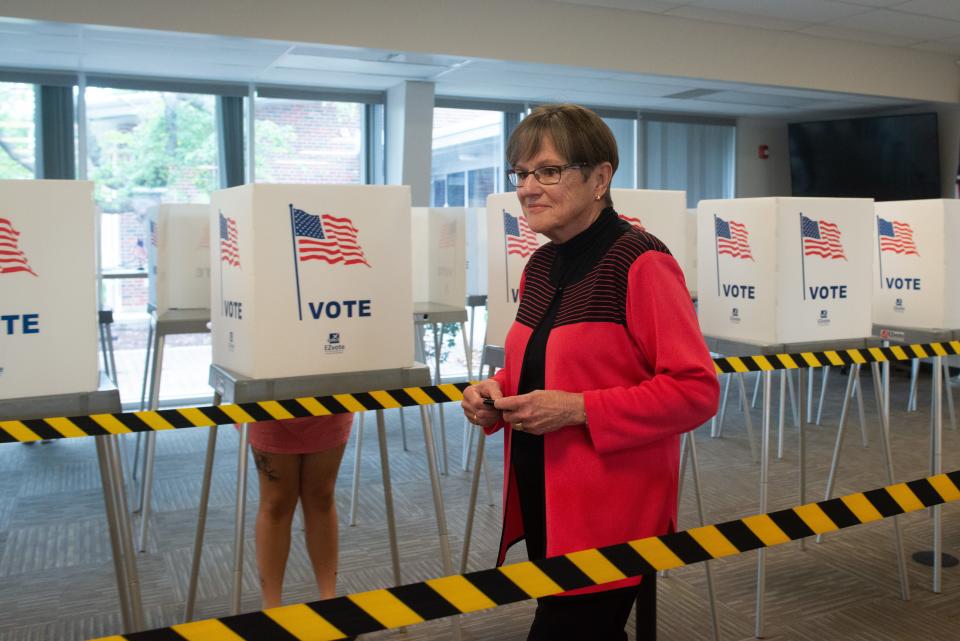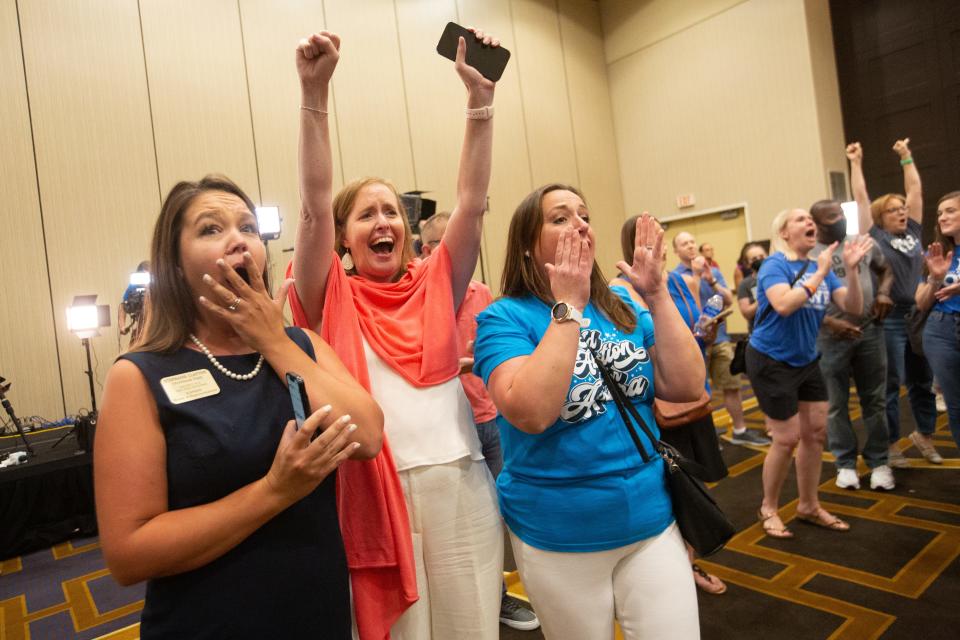Democrats in Kansas scored a win on abortion amendment. Can they repeat the effort in November?
- Oops!Something went wrong.Please try again later.
In a result that raised eyebrows globally, abortion-rights activists won a stunning and decisive victory Tuesday night, defeating a proposed measure that would have ended state constitutional protections for abortion.
The question now becomes if left-leaning groups can do it again in November.
With the amendment's failure to pass, attention will quickly shift to the hotly contested governor's race in the fall, with Democrats fighting to keep incumbent Gov. Laura Kelly in office.
Republicans have viewed the result Tuesday as a wake-up call, one that could galvanize conservatives ahead of the general election.
To be sure, abortion isn't an issue that directly follows party lines. A healthy chunk of the "no" voters were Republican or unaffiliated voters, lifting amendment opposition to victory in rural Kansas counties.

But some liberals believe the statement Kansas voters sent across the country on Tuesday to be a powerful one, with implications in the corridors of the Statehouse and at the ballot box.
"They didn't just lose, they proved the negative," said Christopher Reeves, a former Democratic National Committeeman for Kansas. "They can't say: 'Oh, well, this was close. We didn't have enough people to turn out.' No, this was an outright rejection."
Abortion-rights groups hail coalition in amendment defeat
Immediately after the Associated Press called the race Tuesday night, abortion-rights supporters laid out what they believed to be their winning strategy.
On a call with reporters Wednesday, officials reiterated that the campaign succeeded in building a coalition with voters of all parties and political stripes.
"Kansans had a unique opportunity to protect their constitutional rights and freedom at a time when those rights have been stripped at the federal level," said Rachel Sweet, campaign manager for Kansans for Constitutional Freedom, the largest group urging a "no" vote. "So I think that really did motivate and mobilize voters. And more moderate voters and maybe even, you know, conservative and libertarian voters."
This was boosted by turnout across the state that drifted toward numbers normally seen in a presidential election year.
As of Wednesday morning, roughly 908,000 Kansans had cast ballots in the 2022 election, a 47% turnout rate. That dwarfs the 2018 primary, where turnout sat at 27.2%. Final estimates in 2022 could even approach the general election mark of 56% later that year.
Turnout was heaviest in the state's urban cores. That was also where voter registration and activist engagement spiked the highest after the U.S. Supreme Court overturned Roe v. Wade, ending national protections for abortion rights.
That brought more individuals like Susan Heron, an Overland Park resident, into the fold. Galvanized by the decision, she threw herself into urging a "no" vote on the amendment.
"I've been working, phone banking, writing postcards, doing everything I can to try and support women's reproductive health and their choices," she said. "We have twin granddaughters. So we want to look to their future."
Patrick Miller, a professor of political science at the University of Kansas, said there was little doubt that the Supreme Court ruling was the force that "breathed life" into the amendment opposition.
"When rape victims in states that border us can no longer get an abortion, that's concrete, right?" he said. "People realize that and something like that becomes very compelling to a voter to show up."
Previously: What will happen if Kansas voters pass — or don't pass — constitutional amendment on abortion?
But rural areas mattered, too. Virtually every county in Kansas saw the vote "no" side outperform President Joe Biden and Barbara Bollier, the Democratic nominee for U.S. Senate in 2020.
Consistently Republican counties — such as Osage, Franklin and Greenwood — all voted to oppose the amendment.
And in southwest Kansas, the vote was split right down the middle in Ford, Finney and Seward counties.
Sweet credited organizations specifically targeted at rural areas, such as the New Frontiers Project, for helping to drum up interest in the region.
"I think we often sometimes in the political discourse, you use 'rural' as like a shorthand for white and conservative, and that is not necessarily an accurate representation of rural Kansas," she said. "Rural Kansas is a very diverse place."
How will candidates respond on abortion question in November?
But the logical next question is a more difficult one to address: Will Democrats and their allies be able to carry the momentum forward?
The urgency and high profile of the abortion issue gives it a unique standing at the current moment in American politics, as does the ways in which it crosses the partisan divide.
Miller noted that voters will routinely pull the lever for anti-abortion lawmakers, even if they themselves believe in the right to an abortion, simply because the issue is one of many on their minds.

Gov. Laura Kelly, when asked by reporters before the amendment vote about where abortion falls in the pantheon of issues for general election voters, said she believed it fell behind the economy and education, among other topics.
"I think it is on the list, but if you go down the list, it is probably hovering seventh or eighth," she said.
Kelly's Republican opponent, Attorney General Derek Schmidt, backed the amendment, as did GOP candidates in other top races on the ballot in the fall.
In the 3rd Congressional District, by far the most competitive of the state's seats in Congress, incumbent U.S. Rep. Sharice Davids, D-Kan., was heavily outspoken against the amendment, even going so far as personally going door-to-door to urge a "no" vote.
Her opponent, businessperson Amanda Adkins, was vocal in support of the amendment, and Reeves said this would be a major issue, not just in suburban Johnson County but also in other area counties, such as Miami and Franklin, which are now in the 3rd District.
"Way too many Republicans put their bank on the vote yes," Reeves said.
Both sides see amendment result as potential boost to election efforts

Conservatives have taken a different tack.
Rejecting the outcome as a result of outside spending from abortion providers, they argued the result wasn't about what was occurring in neighboring states but rather voters being misinformed about the issue.
Some have argued the result, particularly the outcome in rural, heavily Republican counties, will actually spur on conservatives.
"It very well may wake up conservatives and Republicans generally, to recognize that we can't take anything for granted and we have to really fight hard," Kris Kobach, who won the Republican primary nomination in the attorney general race Tuesday, said in an interview.
Rep. Stephanie Clayton, D-Overland Park, predicted Republicans would pivot away from certain social issues, such as abortion, in favor of discussing national economic forces, such as inflation.
"This is one of those things where they will try to run away from this as quickly as they can," she said.
But it is unclear that Kelly wants to bring up abortion as an issue either.
While the governor addressed the result in a social media post after the race was called, it did not directly state the word abortion.
Kansans stood up for fundamental rights today. We rejected divisive legislation that jeopardized our economic future & put women's health care access at risk. Together, we'll continue to make incredible strides to make KS the best state in the nation to live freely & do business.
— Laura Kelly (@LauraKellyKS) August 3, 2022
Thus far in the campaign, Kelly has eschewed abortion in favor of other issues, most notably economic development, education funding and infrastructure.
Long regarded as a more guarded elected official, Miller said it wouldn't be surprising if she elected not to campaign extensively on the issue.
"I think if she shies away from talking about abortion, it might be a bit of a missed opportunity for her," he said. "But I certainly understand why it's maybe not something that she's as inclined to do."
But the governor's race isn't the only thing on the ballot for Democrats in November.
A net gain of three seats in the Kansas House would help the minority party break Republicans' supermajority in the chamber, making it more difficult to override a theoretical veto from Kelly.
And it would be more difficult to hit the two-thirds bar needed to take another stab at a constitutional amendment, either on abortion or how Kansas Supreme Court justices are selected.
That's important because conservatives have long assailed the high court for a 2019 ruling that abortion is protected under the Kansas Constitution, the catalytic event for the constitutional amendment in the first place.
It is likely Republicans take a run at not retaining the judges when they are on the ballot in the fall, or changing how they are selected, in an effort to eventually get the ruling reconsidered.
Clayton echoed this sentiment, noting she thought the amendment vote could give her party momentum — provided they kept working in November to give voters a reason to be engaged.
Touting the result too much, she added, would be like a scene in the hit series "Game of Thrones," where a main character was on the verge of victory, only to have his skull crushed moments later.
"You never, ever rest on your laurels, or wave your victory flag," she said. "You know, you take a nap, and then you get up and you start working. And so I think caution is warranted."
Andrew Bahl is a senior statehouse reporter for the Topeka Capital-Journal. He can be reached at abahl@gannett.com or by phone at 443-979-6100.
This article originally appeared on Topeka Capital-Journal: After Kansas' abortion constitutional amendment vote, what comes next?

